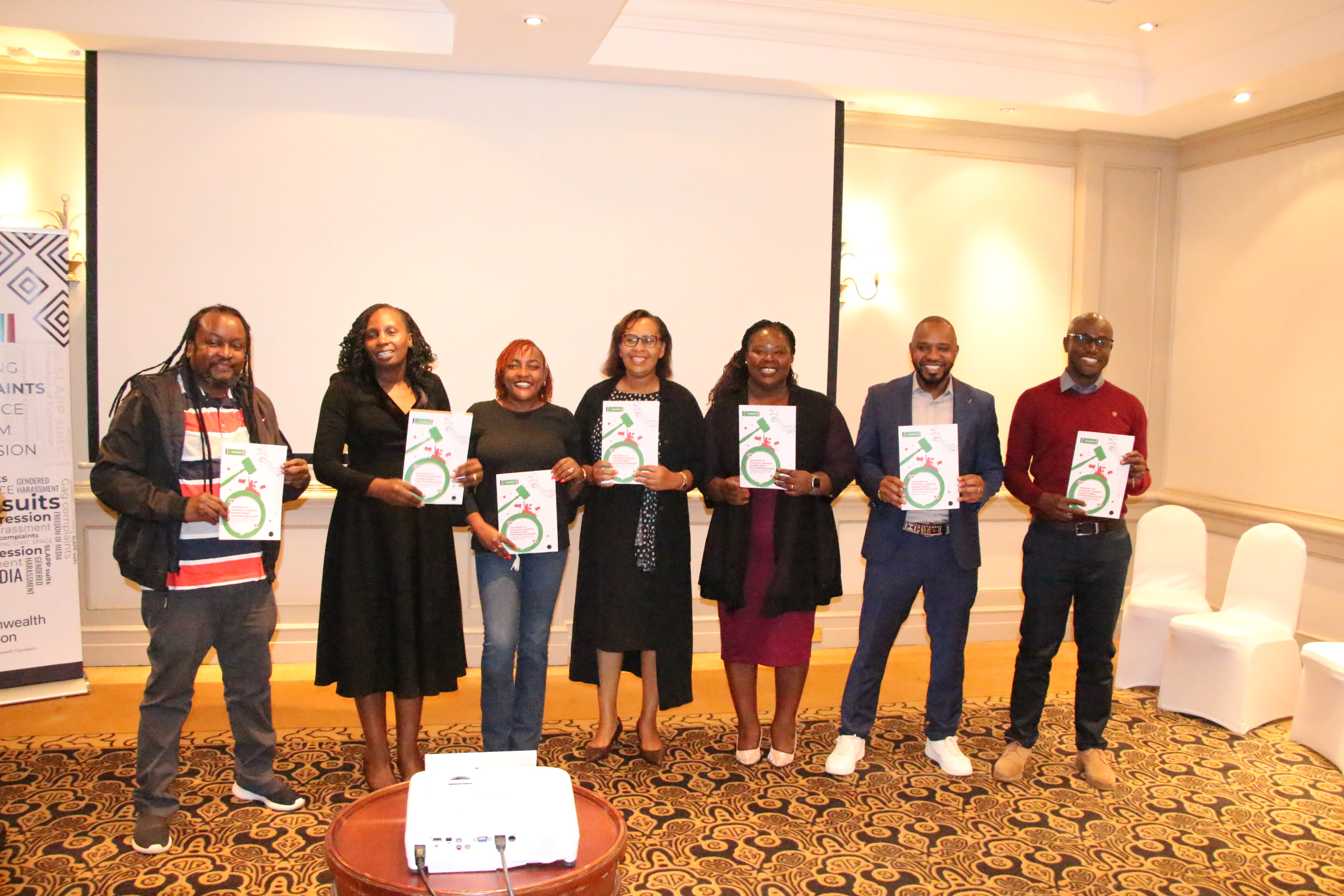Home » Media Centre » Blogs » The Effects of SLAPPs: A Dialogue on the Silencing of Citizen Voices

THE EFFECT OF SLAPP’S: A DIALOGUE ON THE SILENCING OF CITIZEN VOICES
On 9th of April 2024, Mzalendo Trust launched and disseminated a report titled “The Effects of Strategic Lawsuits Against Public Participation (SLAPP) on freedom of expression and citizen participation in public dialogues in Kenya”. The report is informed by a research study, collected from a sample size of 105 online survey respondents from 11 counties, and 15 key informants, aimed at interrogating the freedom of expression environment.
The report highlighted that SLAPP, also known as “defamation suits” are shrinking and threatening the freedom of expression space, as they are silencing those who expose corruption and abuse of office. The report presented that:
The presentation of the report was made by Edward Kakumu, which highlighted the major effects of SLAPP as “the rise of corruption and mismanagement of cases related to media professionals and activists” and “the impact of hefty penalties and damages of SLAPPed victims drives them to psychological and economic disarray” which eventually leads to silence.
A preemptive policy solution was identified as the advocating for amendment of current laws to introduce anti-SLAPP protection measures, to provide a safety shield. As such, the launch aimed to enhance awareness among policymakers, duty-bearers, individuals and professionals within the space, of the effects of SLAPP.
While giving the opening keynote address, Rarieda MP, Hon. Otiende Amollo appreciated the findings, noting that “the report speaks of cases that as lawyers we call prior restraint of speech. It is something that needs to be condemned. Even in Parliament, through prior restraint of action or debate, debate is increasingly becoming affected. This limits the space for us as representatives of the people to make laws. The civil society must be vocal and keep engaging Parliament... Having a constitution that is progressive is not an end in itself. We must eternally defend the constitution from being amended for worse.”
Hon. Otiende was representing the Justice Legal Affairs Committee (JLAC) of National Assembly. Duly, he lauded the efforts of Mzalendo Trust and called upon participants to further identify gaps in various other legislations and committed that the committee would consider. “There are two Public Participation Bills we are currently considering; you must be keen when these laws come to the House to ensure that Public Participation is not limiting but enabling.”
Kesses MP, Hon. Julius Rutto representing the Africans Parliamentarian’s Network Against Corruption (APNAC) Caucus noted that “We gave ourselves a constitution that suits us, but there are some gaps we need to address. Such a study helps us open our minds, especially as legislators, to the tactics used to silence citizen voices, and equip us with information to create a more enabling legal environment”.
To further elaborate on the effects of SLAPP, Mzalendo Trust had organized a panel discussion consisting of victims featured in the report, and experts in the space to share lived experiences and interrogate possible solutions.
Boniface Mwangi, a Journalist and Human Right Advocate, shared a story of how he got into activism and cautioned; “There has been a high physical and emotional toll on me. Threats have been issued against my family to the point where they had to go on exile. While I want to be brave, I have to ask, is it worth it? If you count the cost of whatever you want to do, and you are willing to pay the price, DO IT!” He further suggested that the Law Society of Kenya (LSK) should crack its whip on unscrupulous members who give the society a bad name by enabling corruption through rampant unethical conduct.
“The biggest bottleneck has been corruption in gaining justice for victims. Why are we not calling corruption what it is? It’s theft, it’s thuggery. So how do we simplify this corruption language?” commented Wanjeri Nderu, a Human Rights Advocate and Defender.
She challenged civil society and related organizations to “do more and react quicker”. However, she cautioned those in the field to note that “a dead hero is a useless hero” and advised participants to work in groups and support each other. She ended by proposing formation of a working group on SLAPP with policy makers, duty bearers, human rights and media professionals to support each other and coordinate efforts.
Such sentiments were also significant in lived experiences shared by Mutemi wa Kiama and Kevin Mabonga during a panel session moderated by Philip Gichana, and a per brief speech made by Senior Counsel Harun Ndubi calling on more “reflection sessions, and joint strategy sessions”.
The LSK President, Faith Odhiambo gave the closing remarks indicating that the society was eager to “take the fight to the Executive and Judiciary” but there was need to “work collectively and not sabotage each other”. She gave a recent experience of interactions with the Ethics and Anti-Corruption Commission (EACC), a body she hoped to work closely with during her tenure.
She concluded that “SLAPP suits are not only an abuse of our court process but bear the insufferable consequence of contravening the rule of law and our Constitution. The increased exploitation of SLAPP suits to frustrate calls for accountability and defeat acts done in the public interest is a worrying trend that we must take firm, decisive action against. The Law Society is committed to partnering with all stakeholders to protect our constitutionalism through strategic implementation of counteractive measures.”
The session ended with the Caroline Gaita receiving commitments by the plenary disseminate the report locally as well as online, as well as to adhere to the recommendations of the report and initiate joint ventures towards mitigating the effects of SLAPP.
Categories: SLAPP media freedom freedom of expression strategic lawsuits against public participation
You must login to comment
There are no comments.